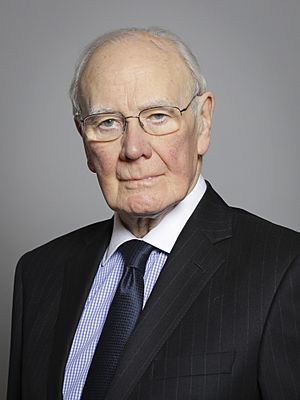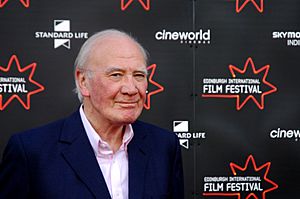Menzies Campbell facts for kids
Quick facts for kids
The Lord Campbell of Pittenweem
|
|
|---|---|

Official portrait, 2019
|
|
| Leader of the Liberal Democrats | |
| In office 2 March 2006 – 15 October 2007 |
|
| Deputy | Vince Cable |
| President | Simon Hughes |
| Preceded by | Charles Kennedy |
| Succeeded by | Nick Clegg |
| Chancellor of the University of St Andrews | |
| In office 9 January 2006 – September 2025 |
|
| Vice-Chancellor |
|
| Preceded by | Kenneth Dover |
| Deputy Leader of the Liberal Democrats | |
| In office 12 February 2003 – 2 March 2006 |
|
| Leader | Charles Kennedy |
| Preceded by | Alan Beith |
| Succeeded by | Vince Cable |
| Liberal Democrats Spokesperson for Defence | |
| In office 12 October 2017 – 21 August 2019 |
|
| Leader | Sir Vince Cable Jo Swinson |
| Preceded by | The Baroness Jolly |
| Succeeded by | Jamie Stone |
| Liberal Democrat Spokesperson for Foreign Affairs | |
| In office 7 May 1992 – 7 January 2006 |
|
| Leader | Paddy Ashdown Charles Kennedy |
| Succeeded by | Michael Moore |
| Member of the House of Lords | |
|
Lord Temporal
|
|
| In office 13 October 2015 – 26 September 2025 as a life peer |
|
| Member of Parliament for North East Fife |
|
| In office 11 June 1987 – 30 March 2015 |
|
| Preceded by | Barry Henderson |
| Succeeded by | Stephen Gethins |
| Personal details | |
| Born |
Walter Menzies Campbell
22 May 1941 Glasgow, Scotland |
| Died | 26 September 2025 (aged 84) London, England |
| Political party | Liberal (before 1988) Liberal Democrats (1988–2025) |
| Spouse |
Elspeth Urquhart
(m. 1970; died 2023) |
| Alma mater | University of Glasgow Stanford University |
| Signature |  |
Walter Menzies Campbell, Baron Campbell of Pittenweem (22 May 1941 – 26 September 2025), often called Ming Campbell, was a British politician, lawyer, and athlete. He was a very important member of the Liberal Democrats party. He served as a Member of Parliament for North East Fife from 1987 to 2015. He also led his party from 2006 to 2007.
Before becoming a politician, Campbell was a fantastic sprinter. He was even the captain of the Great Britain athletics team in the 1960s. He held the British record for the 100-meter race for many years. He studied law at the University of Glasgow and Stanford University. He became a lawyer in Scotland, known as a King's Counsel.
In 2006, Campbell became the Chancellor of the University of St Andrews, a big role at a famous university. He also became a life peer in 2015, which meant he joined the House of Lords. He held both these important positions until he passed away on 26 September 2025.
Contents
Who Was Menzies Campbell?
Menzies Campbell was a remarkable person who achieved success in both sports and politics. He was known for his speed on the running track and his thoughtful approach in Parliament. His life story shows how dedication can lead to many different achievements.
Early Life and Education
Menzies Campbell was born in Glasgow, Scotland, on 22 May 1941. He went to Hillhead High School and then to the University of Glasgow. There, he earned degrees in arts and law.
After his studies in Glasgow, he traveled to the United States. He did more advanced studies in international law at Stanford University in California. In 1968, he became a lawyer in Scotland, a role known as being called to the Scottish Bar. Later, he became a Queen's Counsel in 1984. After King Charles III became king, this title changed to King's Counsel.
A Champion Athlete
Before his political career, Menzies Campbell was a top-level sprinter. He was incredibly fast!
Olympic and International Success
| Medal record | ||
|---|---|---|
| Men's athletics | ||
| Representing |
||
| Summer Universiade | ||
| Gold | 1963 Porto Alegre | 4 x 400 m |
| Silver | 1967 Tokyo | 200 m |
| Silver | 1967 Tokyo | 4 x 400 m |
| Bronze | 1961 Sofia | 4 x 400 m |
| Bronze | 1965 Budapest | 200 m |
| Bronze | 1967 Tokyo | 4 x 100 m |
He broke a 53-year-old Scottish record in 1961 for the 300 yards race. Campbell represented Great Britain at the 1964 Olympic Games in Tokyo. He competed in the 200 meters and the 4x100 meters relay.
He was also the captain of the Scotland team at the 1966 British Empire and Commonwealth Games in Kingston, Jamaica. He led the Great Britain athletics team in 1965 and 1966. From 1967 to 1974, he held the British record for the 100 meters. People even called him "the fastest white man on the planet" because he ran the 100m in 10.2 seconds twice in 1967. He won the British 220 yards championship twice.
Life as a Politician
Menzies Campbell had a long and impactful career in British politics. He was known for his strong views and leadership.
Serving in Parliament
Campbell became a Member of Parliament for North East Fife in 1987. He served in this role for 28 years until 2015. As a spokesperson for foreign affairs, he was a key voice for the Liberal Democrats. He strongly disagreed with the 2003 Iraq War. He believed the government should have shared more information about its legal reasons for the war. He also thought Britain should not always follow the United States' foreign policy without question.
Leading the Liberal Democrats
On 7 January 2006, Campbell became the temporary leader of the Liberal Democrats. This happened after the previous leader, Charles Kennedy, resigned. Campbell then won the election to become the official leader on 2 March 2006. He won with 29,697 votes, beating Chris Huhne.
As leader, he brought many younger politicians into important roles. For example, Nick Clegg became the Home Affairs spokesperson. Jo Swinson, who was only 26, became the Scotland spokesperson.
Challenges and Decisions
Campbell faced some challenges early in his leadership. His performances during the weekly Prime Minister's Questions were sometimes criticized. However, he gained support by speaking out on important issues. These included how the US handled certain prisoners and the conflict in Lebanon.
In 2006, the University of St Andrews gave an honorary degree to former Iranian president Mohammad Khatami. This caused some discussion, but Campbell, as Chancellor, was not directly involved in that decision. In 2007, he was offered a chance for Liberal Democrats to join Gordon Brown's government. After thinking about it, Campbell turned down the offer. He felt the differences between the parties were too great.
Stepping Down from Leadership
After much discussion, Menzies Campbell resigned as leader of the Liberal Democrats on 15 October 2007. He explained that questions about his leadership were getting in the way of the party's progress. Vince Cable, his deputy, became the acting leader.
Some people, including his successor Nick Clegg, said that Campbell had faced unfair criticism because of his age. They called it "barely disguised ageism." The charity Age Concern also spoke out against media coverage that focused too much on his age. They said it showed age discrimination was common in the media.
Retirement from the House of Commons
On 9 October 2013, Campbell announced he would step down as a Member of Parliament in 2015. He felt it was the right time to retire from the House of Commons. Nick Clegg, the Liberal Democrat leader, praised Campbell's long and distinguished service.
In October 2015, he became a life peer and joined the House of Lords. This meant he could continue to contribute to national discussions. He believed the House of Lords should be mostly elected and wanted to promote that idea.
His Ideas and Beliefs
Menzies Campbell had clear ideas about how society and the world should work.
He believed in changing taxes to encourage good things and discourage bad things. For example, he wanted to tax pollution more and reduce taxes for low-income workers. His goal was to make the tax system fairer for everyone.
His main interest was foreign policy. He strongly supported international groups like the European Union and the United Nations. He thought these groups needed to improve to deal with global problems better. He also believed that Britain's relationship with the United States should be balanced. He felt it should not come at the expense of other international partnerships.
Campbell also spoke about the need to support women, disabled people, and ethnic minorities in politics. He wanted them to have more opportunities to become Members of Parliament. In 2009, he joined a group of politicians working for nuclear disarmament. In 2018, he supported the People's Vote campaign, which called for a public vote on the final Brexit deal.
Personal Life
Menzies Campbell married Elspeth Urquhart in June 1970. Elspeth had a son from a previous marriage. Lady Campbell passed away on 5 June 2023.
Death and Tributes
Menzies Campbell passed away in London on 26 September 2025, at the age of 84. Many people from politics and universities shared their sadness and respect. The University of St Andrews lowered its flags to honor him.
Ed Davey, the Liberal Democrat leader, called him "a true Liberal giant." He praised Campbell's "morality, courage and wisdom" for opposing the Iraq War. Alex Cole-Hamilton, the Scottish Liberal Democrat leader, remembered him as "my MP, my mentor and my friend." Scotland's First Minister John Swinney described Campbell as "one of the most distinguished and well-liked political figures of his generation."
Honours and Recognition
Menzies Campbell received many awards and honors throughout his life.
He was appointed a Commander of the Order of the British Empire (CBE) in 1987. He became a Privy Counsellor in 1999. In 2004, he was knighted for his service to Parliament. This honor was given to him by the Prince of Wales.
In 2013, he was appointed a Member of the Order of the Companions of Honour (CH) for his public and political service. He became a life peer in 2015, taking the title Baron Campbell of Pittenweem.
Campbell also received honorary degrees from the University of Glasgow and the University of Strathclyde. He became the Chancellor of the University of St Andrews in 2006. He received an honorary Doctor of Laws degree when he was installed as Chancellor.
 | John T. Biggers |
 | Thomas Blackshear |
 | Mark Bradford |
 | Beverly Buchanan |


